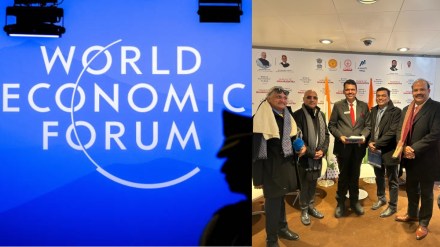India has made significant strides in investment opportunities and strategic collaborations during the 55th Annual Meeting of the World Economic Forum in Davos-Klosters, Switzerland, held from January 20th-24th, 2025. The event, which brought together business leaders and policymakers, was centered around the theme “Collaboration for the Intelligent Age,” addressing five key priorities shaping the global future – Rebuilding trust, reimagining growth, investing in people, safeguarding the planet and industries in the intelligent age.
Key developments and MoUs signed at WEF 2025
Maharashtra
The Maharashtra government has entered into 61 memorandums of understanding (MoUs) totaling an impressive Rs 15.70 lakh crore during the annual World Economic Forum meeting in Davos. Chief Minister Devendra Fadnavis revealed on Thursday that approximately 98% of this investment would come through Foreign Direct Investment (FDI). Highlighting Maharashtra’s emergence as India’s data capital, Fadnavis announced plans to develop an “innovation city” in Navi Mumbai. This ambitious project, powered by artificial intelligence (AI), aims to establish a thriving ecosystem for the AI sector in the state and across the country.
A Hub for Emerging Sectors Maharashtra signs 31 MOUs worth Rs 6.25 lakh crores across various sectors, including fintech and gaming. The state is positioning itself as a New Age business hub with a growing presence of unicorns. Notable MoUs include:
Kalyani Group: Rs 5250 crore investment in defense, steel, and EV sectors, creating 4,000 jobs.
Reliance Infrastructure Ltd.: Rs 16,500 crore investment in defense, generating 2,450 jobs.
Balasore Alloys Ltd.: Rs 17,000 crore investment in steel & metals, providing 3,200 jobs.
Viraj Profiles Pvt Ltd.: Rs 12,000 crore investment in steel & metals, creating 3,500 jobs.
Uttar Pradesh
Expanding Horizons Uttar Pradesh has also attracted significant investment, with a focus on the beverage and manufacturing sectors. Notable agreements include:
Coca-Cola Partnership: Rs 2500 crore investment with Moon Beverages and SLMG Beverages to expand bottling plants and distribution networks.
AB InBev MoU: Rs 1000 crore investment to strengthen the beverage sector.
Telangana
A Hub for Industrial Growth Telangana has emerged as a key destination for industrial growth, with major companies like Unilever, Amazon Web Services, and Skyroot Aerospace engaging in strategic discussions. Unilever plans to establish two new manufacturing units, marking a new chapter in Telangana’s industrial development.
A notable delegation from India participated in the event, led by Sunil Kumar Gupta, Founder of SARC Associates and Indo European Business Forum, along with other influential figures, including Rajendra Bagade, Director of India Global Chamber of Businesses, Chandra Sekhar Akula, Founding Partner of SARC Associates, Probir Roy, Co-Founder of Paymate and Ashutosh Verma, Founder & CEO of Anvi. The group engaged in high-level discussions with key Indian policymakers, including Ashwini Vaishnaw, Union Minister of Railways, Information and Broadcasting and Electronics & IT; Devendra Fadnavis, Chief Minister of Maharashtra; and Uday Samant, Minister of Industries in Maharashtra.
Gupta proposed the immediate recognition of sunrise industries like e-sports, gaming, music, and events, emphasising the need to build world-class infrastructure in India’s youth-driven market. He highlighted that states such as Maharashtra, Uttar Pradesh, and Andhra Pradesh aim to double their GDP in the coming years, with 20% of that growth coming from the digital economy.
Probir Roy, Independent Director at Nazara Technologies, shared his optimism about the role of gaming, e-sports and payments in India’s future economic growth. “I expect 1/5th of India’s GDP growth to stem from gaming, e-sports, and payments,” he stated, referring to the rise of fast-moving tech-driven businesses.
Ashutosh Verma, discussed how AI could disrupt the $1.3 trillion market controlled by informal money lenders, bringing affordable credit to millions of underserved Indians. The event also marked the presentation of Sunil Kumar Gupta’s book Make in India (3rd Edition), emphasising the
